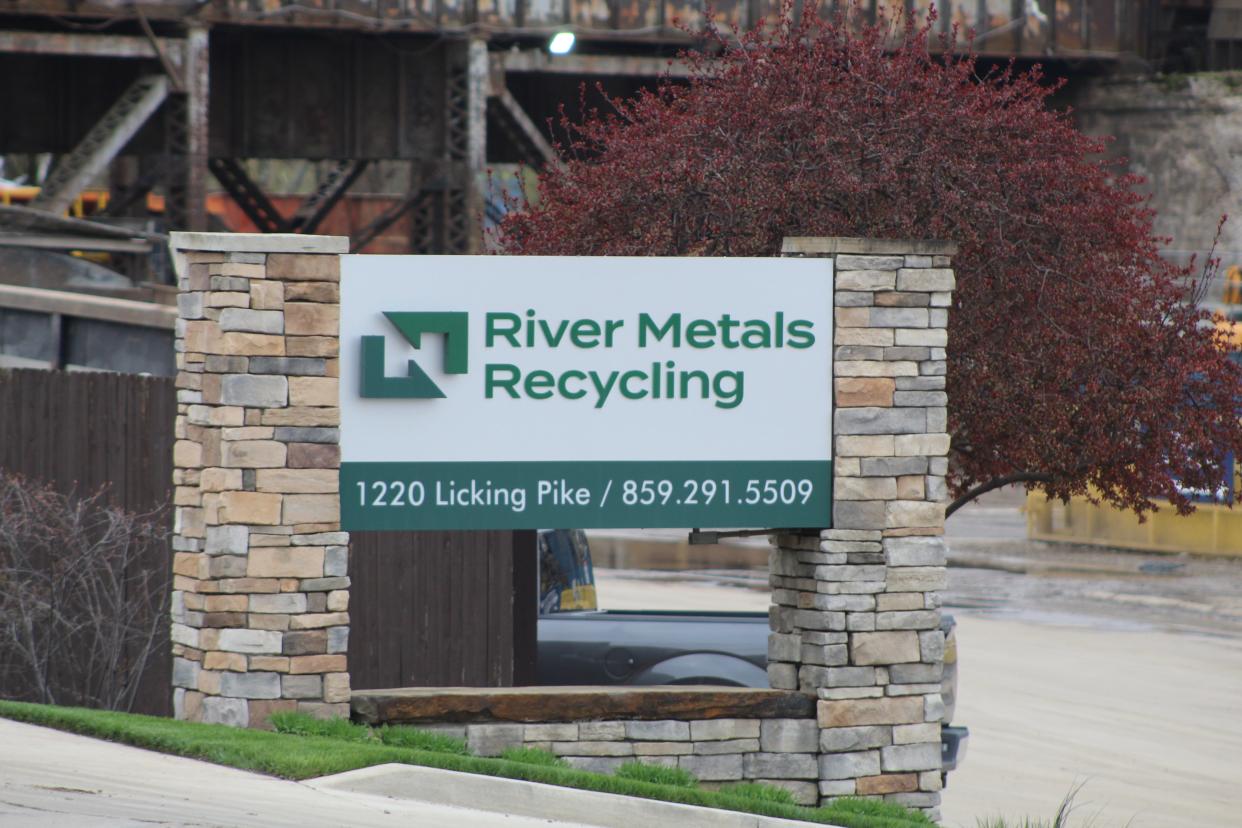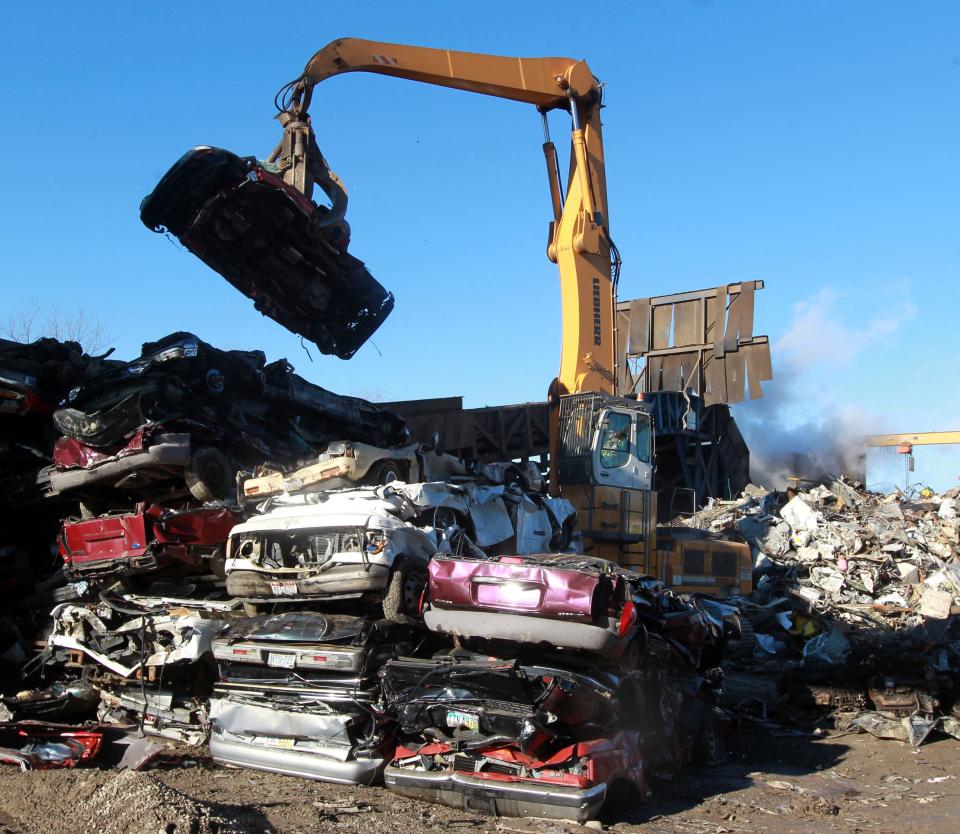'We've got work to do': End is near in River Metals case but community remains vigilant

Residents of Newport’s Clifton neighborhood long complained that explosions from the River Metals Recycling facility on Licking Pike impact their quality of life.
City Commissioner Ken Rechtin likens the noise to an airplane breaking the sound barrier.
“They’re of such an impact that they rattle windows,” Rechtin said, adding the explosions have been an issue for most of the last decade.
A judge in February approved an agreement between the city and River Metals that would eventually see the dismissal of criminal charges as the company ceases its metal shredding operations – the source of residents’ frustration.
While the agreement means an end to the explosions is in sight, Rechtin said it’s not a perfect solution and there’s more work ahead.
“It's very akin to Swiss cheese. There's a lot of holes in it,” Rechtin said.
What are Newport residents’ issues with River Metals?
The crux of the dispute lies with River Metals’ shredder, a large machine capable of scrapping crushed cars, Campbell County District Court filings show.
Occasionally, a propane or gas tank will slip through the metals screening process causing the tanks to combust when passing through the shredder.
Those events number in the dozens annually, as many as 60 within a year, Rechtin said.
A lawsuit filed in 2020 by a Newport resident against River Metals claims the value of his home has been damaged by the plant's noise, vibrations and odors. That suit is ongoing.

Newport’s Clifton Neighborhood Association (not to be confused with the Clifton Community Council in Cincinnati) started lobbying several years ago for River Metals to address problems at the facility.
Company officials assured the residents that steps would be taken to prevent explosions, but the issues persisted, Rechtin said.
After a sound barrier wall erected by the company in 2021 failed to ease residents’ complaints, Newport and the Campbell County Attorney's Office started pursuing misdemeanor noise charges.
A lengthy legal dispute followed, with the company saying the charges were based entirely on problem-ridden sound monitoring from a third-party firm hired by Newport.
What does the agreement say?
As part of the court-approved agreement, River Metals must cease regular operation of its Newport shredder by early next year.
In October, River Metals acquired the assets of Garden Street Iron & Metal in Camp Washington, where it plans to consolidate its shredding operations. The company says the acquisition was part of “unrelated operational changes” and not in response to the legal dispute in Campbell County.
The agreement says continued use of the Newport shredder after River Metals consolidates operations at its new facility is not in the company’s interest due to “staffing, operational and economic issues."
However, River Metals has reserved the right to use its shredder again under specific circumstances, including:
Running the shredder four hours per month, with no materials running through it, to ensure the machine remains operational.
In the event of “mechanical or logistical problems” at River Metals’ recycling facilities in Cincinnati or Louisville and Ashland, Kentucky sites.
If River Metals’ Cincinnati facility temporarily exceeds capacity. However, the company cannot operate its Newport shredder over 75 days per year.
"If market or other conditions significantly change.” In this case, River Metals must first take steps to install a pre-shredder meant to reduce noise.
The agreement is contingent upon River Metals terminating shredding in Newport and installing a fire detection system at its facility there. It offers a path to a long-awaited solution but doesn’t immediately solve residents’ problems or dismiss the charges.
River Metals has not admitted to any wrongdoing as part of the agreement. The company says its Newport facility will continue handling collections, sorting and shipping once shredding stops.
“We value our very positive working relationship with the City of Newport, which has spanned several decades,” Neal Coulardot, River Metals regional manager, said in a statement.
“This business has been at this Newport location since World War II, and we’re proud to have continued its operation for the last 40 years,” Coulardot added.
The city does not have the power to enforce the agreement, but prosecution of the criminal charges may resume if River Metals is found in violation.
In the meantime, things will be business as usual at the Newport plant. Posts to the Clifton Neighborhood Association Facebook group show blasts continuing at the plant, with the latest one reported on March 18.
“We didn’t get to this point in a day or a day-and-a-half,” Rechtin said. “This is a longstanding, troublesome problem and it’s not going to be resolved with one act of one written agreement.”
"We have to be ever vigilant to make sure that this does stop and that it doesn't happen again. And so we've got work to do," the commissioner added.
What’s next?
In 2021, the U.S. Environmental Protection Agency issued an enforcement alert putting the owners of the nation’s roughly 250 metal recycling facilities on notice. Officials pointed to violations of the Clean Air Act tied to air pollution caused by auto and scrap metal shredders.
Rechtin said the EPA’s alert opened his eyes to the possibility that noise and rattling windows might only be part of the problem.
“We’re now talking about something that has negative impacts on the health of my constituents and the people that live in my city,” the commissioner said.
The EPA has loaned the community nearly a dozen air quality monitors to test for particulate matter, air pollutants smaller than the diameter of a hair, emitted from River Metals, Rechtin said.
Those devices, combined with infrared video equipment set up to monitor the facility, will capture whether explosions at River Metals coincide with spikes in negative air quality.
The commissioner said the air quality monitors were installed early this year and will remain in place for at least a year, with federal officials also reviewing the results.
Air quality isn’t the only thing being tested.
Northern Kentucky University professor Chris Curran said her environmental toxicology students are investigating residents’ concerns, including testing soil and water for toxic metals.
While the students’ testing has been limited to areas where they’ve received permission from property owners, Curran said, the goal is to identify areas with the highest metal concentration and guide further study of River Metals’ impact on the community.
The students are expected to publish a written report on their findings at the end of the spring semester. As a bonus, Curran said, her students are gaining real-world experience.
“How often does someone tell you that your class semester project has such value?” she said. “So it’s great for the students, it’s great for the community.”
Will things be different in Camp Washington?
River Metals says it is making improvements to modernize its newly acquired Camp Washington facility, including adding a “state-of-the-art” pre-shredder, which will cost $5 million to install and add roughly $600,000 in annual operating costs.
While traditional automobile shredders operate at a high speed, a company statement says the pre-shredder uses a “low-speed, high-torque approach” to reduce sporadic industrial noise events.
“RMR has aggressively pursued the refinement of this technology with industry leaders over the last five years because of its longtime commitment to being a good neighbor,” the statement reads.
Under the facility’s previous ownership, there were persistent environmental concerns, including finely shredded metal dusting the vehicles of a nearby fire station, said Paul Grilli, president of the Camp Washington Community Council.
While Grilli hopes the community council and River Metals will be able to communicate about any possible issues, he said council members will ensure complaints are brought to the city or environmental authorities.
“The previous owners, for whatever their flaws were, at least they showed their face,” Grilli said.
This article originally appeared on Cincinnati Enquirer: River Metals Recycling: Community remains vigilant as resolution nears

